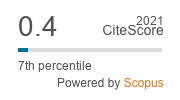Effect of heat shock on embryonic development and its impact on commercial traits of silkworm Bombyx mori. L
DOI:
https://doi.org/10.33307/entomon.v48i3.940Abstract
The early stage of an organism – embryonic stage, architects all the post embryonic developments which are governed by genetic and environmental conditions, but the effect of hot events during that stage remain obscure in the silkworm Bombyx mori L. Thus, APM1; a multivoltine parental breed of a ruling CB and APHO1 silkworm breed developed through induction of thermotolerance, and APHO1 breed to examine the impact of heat shock (HS) on the embryo and resulta nt larvae. Different developmental stages of embryo were exposed to varied HS temperatures for 2 h followed by a 2 h recovery period. After HS the eggs and the resultant larvae were reared under normal environmental conditions. Interestingly, 450C although determined as lethal temperature yielded vibrant larvae. Whereas APM1 and APHO1 eggs heat shocked at 350C exhibited increased hatching (91.66 and 69.33%), larval weight (1.72 and 3.33 g), effective rate of rearing (72.39 and 81.93%), cocoon weight (1.01 and1.6 g), shell weight (0.12 and 0.29 g), shell ratio (13.11 and 20.52%) and pupal weights (0.87 and1.29g) when compared to control APM1 and APHO1. Besides increased total protein content, expression of 205 kDa, 90 kDa and 70 kDa heat shock proteins and the glycogen content was found more on day - 3 compared to day - 2 in the embryos of APM1 and APHO1 which eventually declined as the embryonic development proceeded to hatching. This work shows that APM1 and APHO1 eggs had shown profound response to HS temperatures exhibiting varied acquired thermotolerance to overcome fluctuating environmental condition.


